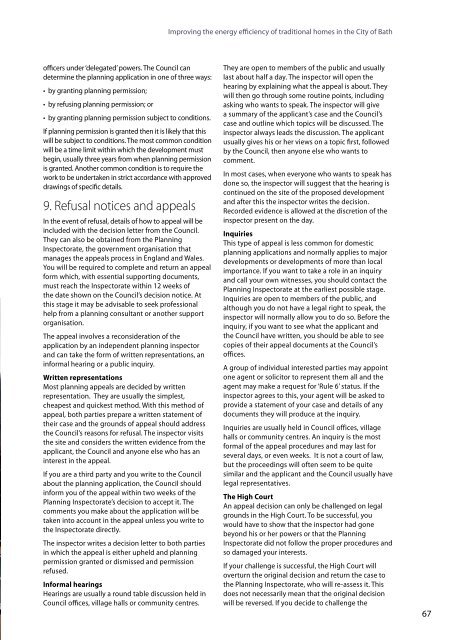Warmer Bath
Create successful ePaper yourself
Turn your PDF publications into a flip-book with our unique Google optimized e-Paper software.
Improving the energy efficiency of traditional homes in the City of <strong>Bath</strong><br />
officers under ‘delegated’ powers. The Council can<br />
determine the planning application in one of three ways:<br />
• by granting planning permission;<br />
• by refusing planning permission; or<br />
• by granting planning permission subject to conditions.<br />
If planning permission is granted then it is likely that this<br />
will be subject to conditions. The most common condition<br />
will be a time limit within which the development must<br />
begin, usually three years from when planning permission<br />
is granted. Another common condition is to require the<br />
work to be undertaken in strict accordance with approved<br />
drawings of specific details.<br />
9. Refusal notices and appeals<br />
In the event of refusal, details of how to appeal will be<br />
included with the decision letter from the Council.<br />
They can also be obtained from the Planning<br />
Inspectorate, the government organisation that<br />
manages the appeals process in England and Wales.<br />
You will be required to complete and return an appeal<br />
form which, with essential supporting documents,<br />
must reach the Inspectorate within 12 weeks of<br />
the date shown on the Council’s decision notice. At<br />
this stage it may be advisable to seek professional<br />
help from a planning consultant or another support<br />
organisation.<br />
The appeal involves a reconsideration of the<br />
application by an independent planning inspector<br />
and can take the form of written representations, an<br />
informal hearing or a public inquiry.<br />
Written representations<br />
Most planning appeals are decided by written<br />
representation. They are usually the simplest,<br />
cheapest and quickest method. With this method of<br />
appeal, both parties prepare a written statement of<br />
their case and the grounds of appeal should address<br />
the Council’s reasons for refusal. The inspector visits<br />
the site and considers the written evidence from the<br />
applicant, the Council and anyone else who has an<br />
interest in the appeal.<br />
If you are a third party and you write to the Council<br />
about the planning application, the Council should<br />
inform you of the appeal within two weeks of the<br />
Planning Inspectorate’s decision to accept it. The<br />
comments you make about the application will be<br />
taken into account in the appeal unless you write to<br />
the Inspectorate directly.<br />
The inspector writes a decision letter to both parties<br />
in which the appeal is either upheld and planning<br />
permission granted or dismissed and permission<br />
refused.<br />
Informal hearings<br />
Hearings are usually a round table discussion held in<br />
Council offices, village halls or community centres.<br />
They are open to members of the public and usually<br />
last about half a day. The inspector will open the<br />
hearing by explaining what the appeal is about. They<br />
will then go through some routine points, including<br />
asking who wants to speak. The inspector will give<br />
a summary of the applicant’s case and the Council’s<br />
case and outline which topics will be discussed. The<br />
inspector always leads the discussion. The applicant<br />
usually gives his or her views on a topic first, followed<br />
by the Council, then anyone else who wants to<br />
comment.<br />
In most cases, when everyone who wants to speak has<br />
done so, the inspector will suggest that the hearing is<br />
continued on the site of the proposed development<br />
and after this the inspector writes the decision.<br />
Recorded evidence is allowed at the discretion of the<br />
inspector present on the day.<br />
Inquiries<br />
This type of appeal is less common for domestic<br />
planning applications and normally applies to major<br />
developments or developments of more than local<br />
importance. If you want to take a role in an inquiry<br />
and call your own witnesses, you should contact the<br />
Planning Inspectorate at the earliest possible stage.<br />
Inquiries are open to members of the public, and<br />
although you do not have a legal right to speak, the<br />
inspector will normally allow you to do so. Before the<br />
inquiry, if you want to see what the applicant and<br />
the Council have written, you should be able to see<br />
copies of their appeal documents at the Council’s<br />
offices.<br />
A group of individual interested parties may appoint<br />
one agent or solicitor to represent them all and the<br />
agent may make a request for ‘Rule 6’ status. If the<br />
inspector agrees to this, your agent will be asked to<br />
provide a statement of your case and details of any<br />
documents they will produce at the inquiry.<br />
Inquiries are usually held in Council offices, village<br />
halls or community centres. An inquiry is the most<br />
formal of the appeal procedures and may last for<br />
several days, or even weeks. It is not a court of law,<br />
but the proceedings will often seem to be quite<br />
similar and the applicant and the Council usually have<br />
legal representatives.<br />
The High Court<br />
An appeal decision can only be challenged on legal<br />
grounds in the High Court. To be successful, you<br />
would have to show that the inspector had gone<br />
beyond his or her powers or that the Planning<br />
Inspectorate did not follow the proper procedures and<br />
so damaged your interests.<br />
If your challenge is successful, the High Court will<br />
overturn the original decision and return the case to<br />
the Planning Inspectorate, who will re-assess it. This<br />
does not necessarily mean that the original decision<br />
will be reversed. If you decide to challenge the<br />
67


